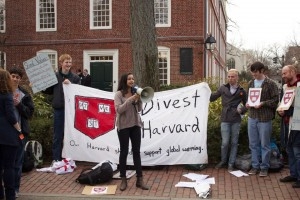In the wake of recent campus-wide, alumni-led protests demanding that Harvard divest its portfolio of fossil-fuel-related investments, it has become apparent that few, if any, on campus actually know what the term 'divestment' means.
“I’m not sure what divestment actually is,” admitted Mark J, a sophomore self-described as ‘very interested in concentrating in economics’. He continued, after sheepishly glancing down at his Ec1010 pset marked with an A+, “But I think it would be a good idea for Harvard not to associate itself with industries that use fossil fuels to create products—like cars or elevators or electricity.”
Joanne L, a harried-looking senior spotted hurrying towards Emerson Hall looked puzzled when we asked her about divestment, but responded immediately due to her four years of honing bullshitting skills as a philosophy concentrator. “I believe Harvard needs to Do the Right Thing,” she said. “From a purely Millian perspective, Harvard should seek to maximize the utility it engages in the creation of.”
Interested in a more rounded perspective, the public was asked its opinion as well. A Chinese tourist at the foot of the John Harvard statue seemed vaguely confused about what a ‘personal opinion’ was. When we explained what that meant, he gravely responded, “我坐在实实在在的步骤,这些步骤."
The president of Harvard University, Drew Faust, could not be reached for a comment. Therefore at this moment, we cannot confirm or deny whether President Faust understands what divestment is herself.
Do you know what divestment means? Do you have an opinion as to whether Harvard should divest its investment of fossil fuels? It's okay; we don't really, either.



